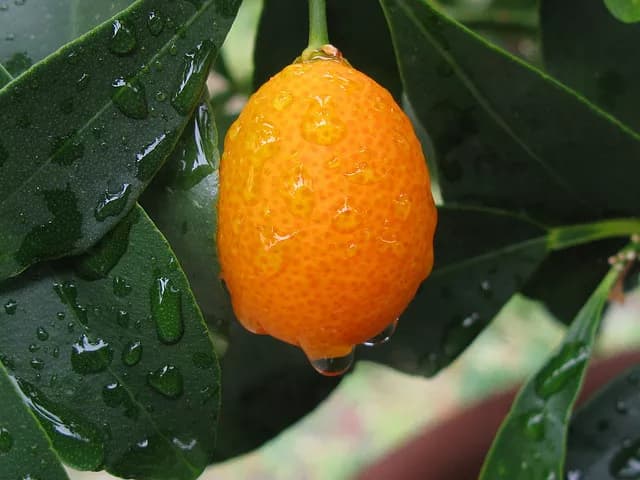Kumquats or cumquats are a group of small fruit-bearing trees in the flowering plant family Rutaceae, either forming the genus Fortunella. The edible fruit of the tree resembles an orange (Citrus sinensis) but is much smaller and more oval. Its size and shape closely resemble that of a large olive. Kumquats are cultivated in China, South Korea, North Korea, Taiwan, Southeast Asia, Nepal, Japan, the Middle East, Iran, Europe, southern Pakistan, and the southern United States. This fruit can be used for candying and making preserves, marmalade, and jelly. Also, kumquats can be added to salads.
Here are 7 health benefits of kumquats.
1. Kumquats are low in calories.
The high fiber and water content, low calories, and significant carbohydrate composition make kumquats ideal for helping people lose weight. They will fill you up and keep you healthy, which will reduce your urge to overeat.
2. Kumquats will improve digestive health.
Kumquats are a great source of fiber. The daily recommended dietary fiber intake for men and women are 38 grams and 25 grams, respectively. Fiber can help alleviate constipation, making one’s bowel movement easier to manage. One hundred grams of kumquats contain 6.5 grams of dietary fiber.
3. Kumquats can leave your skin and hair feeling youthful.
Sufficient vitamin C can create and maintain collagen, an essential protein found in hair and skin. One hundred grams of kumquats have 163 percent of the vitamin C daily requirements. Also, one hundred grams of kumquats contain vitamin A. Vitamin A has been known to keep the hair moisturized through increased sebum production.
4. Kumquats can help individuals fight infections and possibly cancer.
Vitamin C is a great natural water-soluble antioxidant that helps the body develop resistance against infectious agents and eliminates cancer-causing free radicals in the body.
5. Kumquats can help maintain a healthy blood pressure.
Kumquats have a remarkable potassium to sodium ratio, which can help persons with high blood pressure. One hundred grams of kumquats contain 186 milligrams of potassium, compared to only 10 milligrams of sodium. This helps the blood vessels relax and maintains proper blood pressure.
6. Kumquats may not spike your blood sugar levels.
Foods high on the glycemic index like white rice and white bread will break down easily and cause blood sugar and insulin level spikes after meals, which is followed by rapidly dropping blood sugar levels. People with type 2 diabetes may like kumquats because the sugar in kumquats is slowly absorbed into the bloodstream, which prevents sugar crashes, sugar cravings, and mood swings. Talk to your doctor first before consuming them.
7. Kumquats can assist in antioxidant defense.
One hundred grams of kumquats make up 7 percent of the daily recommendation for the mineral manganese, which is an essential cofactor in some enzymes important in antioxidant defenses.
Related Articles
Test Your Knowledge
Asked by users
Related Centers
Related Specialties
Related Physicians
Related Procedures
Related Resources
Join DoveHubs
and connect with fellow professionals


0 Comments
Please log in to post a comment.